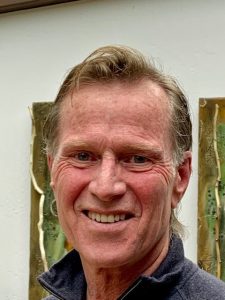 Scott Fortlage, director at pharmaceutical giant Genentech, talks about management and motivation of employees during COVID-19
Scott Fortlage, director at pharmaceutical giant Genentech, talks about management and motivation of employees during COVID-19
Interview by Lilly Drumeva-O’Reilly
We live in difficult times and it is hard to find the balance between staying at home, avoiding the virus and saving lives, and keeping the business running, saving our companies and employees. This was the topic of my conversation with Mr. Scott Fortlage, one of the directors of Genentech Inc. in San Francisco, CA.
Every company and organization is suffering at the moment. What recommendations can you give us for motivating the staff and surviving?
These are challenging times and a true test of one’s personnel and professional character and resilience. With so many different work conditions occurring, the one thing I can say that is common for our survival, is to remember the entire world is going through this and having empathy and understanding for your colleagues is vital. Remember there may be unseen benefit and areas for opportunity during this time of uncertainty. If your business is considered “essential” and continues to stay open, it is obviously a bit easier to motivate employees. Challenging them to innovate with new ways of working and perhaps finding a niche to help support COVID-19 response provides a sense of community and humanitarian support. Also, revisiting the company’s vision and mission will help focus attention on why the work they are performing is so important. Lastly, as a senior leader, I believe it’s incumbent on me to spend extra time (virtually) with each of my employees and connect with them on a more personal level. By doing this, I’m able to provide immediate guidance, recognition and motivation which otherwise would not be so deliberate in our normal business operation situation.
How do you expect that companies and organizations will have to adjust to a new reality: the desire for their employees to continue to work at home after the pandemic is over? (Avoidance of commuting, flexibility in working time, etc.)
This situation could most definitely create a fundamental and permanent shift in how and where employees work. Many businesses such as tech, already accommodate a work from home (WFH) structure and I know of some tech companies here in Silicon Valley have already extended their WFH arrangement through September 2020. For us at the Genentech site in San Francisco, a WFH policy has been in place for many years for employees who are in roles not requiring on-site work execution. We consider this a privilege and have worked hard to ensure employee productivity and business continuity are maintained. If companies want (or need) to develop a WFH policy, there are a few essential elements that need consideration. First, develop a policy that outlines the guidelines and expectations; second, ensure your employees have the proper tools to be productive (e.g., ergonomics, conductivity, dedicated space, technology, etc.); third, on-site work should be balanced with working from home to ensure employees do not lose connection with the business and their colleagues. At first, managing staff who work remotely can be challenging and, honestly, not everyone will find it appealing. However, once things settle into place, you’ll find that employees can thrive, be very productive and ultimately appreciate the flexibility.
How has shelter-in-place affected managers’ ability to “manage”? Has technology – like “Zoom” – produced more benefits or more problems?
Speaking from my personal experience, it has been a short learning curve to manage 100% remotely. Technology has certainly made it easier, but like anything else, it takes a while to get comfortable and efficient. Fortunately for us, we were already working in an environment that supports remote work so most of the tools were already deployed and stable. The entire Roche network uses the Google suite of tools, which provides immediate on-screen collaboration for programs such as Word, Excel and Powerpoint. Google Hangouts is used for all face-time meetings. Probably the biggest technology issue was bandwidth for our secure network login, which has mostly been resolved 4 weeks into the shelter-in-place.
The remote work situation has also provided windows into our colleagues’ personal lives, which has been very fun and interesting. I have seen my colleagues’ partners and children, homes, and animals. We see each other without make-up or our hair combed and in our favorite cozy sweater. This is all ok, and it is this authentic interaction that has deepened our relationships and allowed more personal disclosure in a safe and supported environment. Because of this, we will all be closer colleagues and potentially a bit more understanding of one another when we get back to “normal”.
Have you been able to measure the effect on corporate productivity of people working for technology companies from home? If productivity has been unaffected, what do companies do with all their physical space being now unused?
We have prioritized the work we perform and concentrated on our primary mission, which is to supply lifesaving medicines to patients. Since Roche and Genentech are considered an “essential business”, this has not stopped and we continue to evaluate current and upcoming campaigns to ensure the supply chain is not interrupted. Therefore, from that perspective, productivity has not been impacted. There are, however, departments that have slowed their work but I believe it is too early to calculate the true impact on productivity.
How has Genentech been able to blend successfully its mission and focus with Roche, the company that acquired Genentech, particularly when trying to address answers to a pandemic like COVID-19? Who does what?
Roche wholly purchased Genentech in 2009, but Roche had been invested in Genentech since 1989 in a minority stake. For the first few years after the buyout it was like any new marriage, it had its challenges. Intrinsically, the mission and vision of both companies were never too far apart and Roche and Genentech have worked hard to embrace and leverage each other’s strengths and create robust business partnerships and efficiencies. Genentech discovers and produces biologic therapeutics for unmet medical needs using protein-based cell culture and bacteria (large molecule), where Roche’s drugs are primarily chemical based small molecule. Roche also develops and manufactures diagnostics and drug devices, which Genentech does not.
In support of the COVID-19 situation, Roche developed, manufactured and distributed millions of the high-speed reliable virus tests in record time, while one of Genentech’s drugs, Actemra, is currently in late stage clinical trials to determine if it can be used to treat people suffering from severe pneumonia caused by the virus. Additionally, many of our discovery scientists have been using their discretionary time to research new treatments to combat COVID-19.
How do you envisage life after COVID-19? What can we learn from this crisis, what conclusions can we draw?
It will not be overnight, but the world will transition back to a stable way of life. The pandemic has been a true resiliency test of health care systems, supply chain logistics, and our personal lives. I’m hopeful individuals and businesses will be better prepared for future events, which may alleviate some of the “panic” behaviors we’ve seen, at least in the United States. Unfortunately, many small businesses have not or will not survive, but with that comes opportunity. People who lost their jobs will eventually get back to work and help contribute to a stable society and economy. We may see “new norms” around social interaction and messaging about healthy behaviors.
I think people will, hopefully not just for the near term, appreciate the things they have, understanding they don’t need as much as they think, and actually realize the fundamental things needed to survive and be happy. I see and experience all types of kindness in my community right now, and my hope is that we can carry that kindness and empathy into the future. For me personally, this time has helped me slow down, reflect and spend some quality time with my family – which I will never forget.
Mr. Fortlage, thank you for this interview!
Scott Fortlage is an established Facility and Compliance leader with expert level GMP, quality systems knowledge and a history of driving a culture of quality within biotech organizations. Rooted in maintenance and facilities, he has three decades of experience building strong teams capable of designing, implementing and overseeing efficient and effective GMP maintenance systems and processes in accordance with global standards leveraging risk management principles. Having a profoundly rewarding mentee experience early in his career, Scott is passionate and takes great care regarding people development, and truly believes the organizations’ primary and most valuable asset are the employees. Scott focuses on situational learning and mentoring and strives to develop his staff and other employees to become star players in competitive environments. Specialties: Pharmaceutical Quality Systems, auditing programs, compliance consultation, inspection preparation and management. Excellent mentor with strong leadership and collaborations skills. Excellent business process development skills. Lean/Six Sigma facilitator.
Current position: Genentech Inc, Facilities Compliance Director, South San Francisco, CA
 Michael Bigham, US pharmaceutical expert, talks about Coronavirus research
Michael Bigham, US pharmaceutical expert, talks about Coronavirus research
by Lilly Drumeva-O’Reilly
The earth stands still, waiting for a cure for COVID-19. We hope the cure will be discovered in a country like the USA, Germany, the UK, Japan, Israel etc. Some of the USA’s leading pharmaceutical companies are already testing various medications and conducting clinical research. With regards to this, I spoke to Michael Bigham, former vice-president of Gilead Sciences.
Mr. Bigham, is there a chance for us to discover a cure for the coronavirus any time soon?
Much is known already about this corona virus, SARS-CoV-2, and more is being learned on a “real time” basis. This virus is widely believed to be the cause of the infection COVID-19. Several potential treatments are currently being evaluated with many more coming. It is too early to tell what may or may not work. It is likely that some combination of treatments may be the most effective, as we have seen with other viral infections, for example the triple therapy used to treat AIDS. And some treatments may only work well early in the infection while others will hopefully work even with severe infections. We just do not know yet.
We should hear about early clinical data on a few potential treatments in the months ahead. One of the more promising potential treatments is Remdesivir, a drug being developed by my former company, Gilead Sciences. It targets an enzyme called RNA polymerase that is used by many viruses to replicate. There is published data suggesting it works against other corona viruses, but those tests were only in lab dishes. The first clinical data should become available sometime this month.
One can go online at COVID-19 ClinicalTrials.gov to see a summary of the extensive list of treatments under active consideration.
The main goal of most treatments for viral infections involves stopping the virus from replicating. This has two main benefits: first, it enables the immune system to neutralize the virus more easily as there are fewer viruses to attack. Secondly, it reduces the possibility that the virus will mutate over time into a potentially more dangerous form.
What research is being conducted in the companies you’ve worked in over the years?
My former company, Gilead Sciences, is developing one of the most promising potential treatments, Remdesivir, mentioned above. Many other treatments/treatment regimens being evaluated or soon to be evaluated can be seen on the website mentioned above.
One challenge with any viral infection, such as COVID-19, is the potential for patients to develop secondary bacterial infections. The data to date suggests that patients with COVID-19 who also develop secondary bacterial infections suffer higher rates of both morbidity and mortality. My current company, Paratek Pharmaceuticals, developed a broad-spectrum antibiotic that is approved in the U.S. to treat bacterial pneumonia. The drug is called NUZYRA. We believe it can play an active role in treating the secondary infections that can accompany COVID-19 infections.
How far are we from developing a vaccine?
Arguably the quickest and safest way for our communities to develop “herd immunity” is a safe and effective vaccine. Dr. Anthony Fauci, director of the NIAID, called the development of a COVID-19 vaccine “an urgent public health priority”. Several potential vaccines are under active development. J+J recently announced their plans to start clinical trials on a potential vaccine this fall. Pfizer announced plans to start clinical studies on a potential vaccine in the next several weeks. The NIH, working with Moderna Inc., has already started a Phase 1 clinical study with a potential vaccine.
Developing a safe, effective vaccine will take time but it appears that both industry and regulators are working in tandem to make the process as efficient as possible. The sense of urgency is real. The exact timing of when a vaccine may become available is hard to predict today as we have no data on what may or may not work. If one or more of the vaccines being developed demonstrate appropriate safety and efficacy soon it is possible that a vaccine/vaccines could be available as early as the first half of 2021.
Manufacturing the large number of vaccines needed is a secondary challenge. One can expect that the first vaccines available will likely be prioritized to health care providers and those considered at “high risk” of developing a severe infection. But efforts are no doubt underway to anticipate the manufacture of high volumes of vaccine as soon as possible.
Numerous medications are sold which alleviate COVID-19 symptoms – medications based on quinine which are effective against malaria; the antibiotic Azithromycin, which is very useful against pneumonia; a tuberculosis vaccine which gives additional resistance; various supplements, like ginger. Could you comment on these treatment options or do we have to explore in different directions?
The scientific and clinical communities must explore many directions in parallel to find “what works.” There is some rationale for the approaches mentioned, but without proper clinical studies one cannot know definitively what does or does not work.
How dangerous is COVID-19 really? It seems to me that there are many differing opinions and an unknown factor. For example, why is it that some people fall ill and others do not; some have serious complications and others – very mild symptoms, as if scientists are missing something?
This is a “new” virus; much remains to be learned. It appears to cause symptoms similar to both a bad head cold (normally caused by less lethal corona virus strains) as well as influenza. It is also becoming clear that this virus settles deep in the lungs as opposed to influenza which typically settles higher in the lungs. There is also growing evidence that this virus may have cardiovascular effects not typically seen with other viral infections. Overall, it is currently believed that people over age 60 and those with pre-existing co-morbidities are the ones at highest risk. The fatalities to date have been concentrated in these groups, though not exclusively.
Many sectors of the economy are completely stunted, while some, for example the pharmaceutical industry, are flourishing. People are hoarding medication and some prices have skyrocketed. How do you envisage the development of pharmaceutical companies in the context of the crisis and after it? How can they be more useful to people?
Drug and vaccine development are complex, time-consuming activities that typically require many years of research and development. The failure rates are high, and the costs of development – significant. Manufacturing a drug or vaccine is equally complex, time-consuming and costly. Accelerating these processes is difficult.
Pandemics present a unique challenge as they are often hard to predict with accuracy. The best “treatment” is early detection; to catch any potential pandemic early and isolate it. Prevention is by far the best “medicine”.
It is also essential to establish significant stockpiles of protective gear such as masks, gowns and gloves. And, to stockpile any essential equipment likely to be needed in any pandemic, such as ventilators.
Developing appropriate treatments and vaccines for a pandemic take longer because the infectious agent must first be identified and characterized. However, creating stockpiles of drugs that are most likely to be needed in any pandemic also makes sense: antibiotics; anti-inflammatory agents; pain medications, for example. This will help alleviate any shortages that might otherwise arise, as well as minimize the temptation for some to “hoard”.
How do you envisage life after COVID-19? What can we learn from this crisis, what conclusions can we draw?
We are fortunate that this virus is not more lethal than it is; otherwise this pandemic would be far worse. The so-called Spanish Flu of 1918-20 was more lethal [I recommend the book “The Great Influenza”, which describes that pandemic well]. And the great plagues caused by bacterial infections in the middle ages were even more lethal with mortality estimates as high as 50%. But this does not lessen the human tragedy unfolding around us.
Processes must be adopted to improve “early detection” and isolation of potential pandemics.
Processes by which societies implement “shelter at home” and quarantines must be better communicated across communities for rapid adoption. Practices such as the “wet” markets in Asia must be eliminated; they are perfect breeding grounds for future pandemics. And societies must stockpile those items most likely to be used in any pandemic to improve initial responses, protect our healthcare providers and discourage “hoarding” behavior.
Our “global” economy provides unique opportunities for pandemics to spread and spread quickly. There will be more if we are not more diligent and better prepared.
Life will eventually return to something very much like the “normal” we experienced prior to this pandemic. However, it will take time for us to feel comfortable again being around others. It may well not be possible on any real scale until a treatment is available to prevent or reverse serious illness from the infection. A safe and effective vaccine is the very best option. Once we feel “safe” I would expect that we will actively return to our native form: we are a very “social” species.
Mr. Bigham, thank you for this interview. Good luck and all the best!
Michael Bigham has held leading positions in some of the largest pharmaceutical companies and has developed cancer treatment medication as well as some of the newest and strongest antibiotics. He is a true guru in the pharmaceutical and medical industry in the USA. Additionally, he is a very successful businessman, entrepreneur and investor.
Michael F. Bigham was appointed Chief Executive Officer and Chairman of Paratek Pharmaceuticals’ Board of Directors in October 2014. He has more than 25 years of senior leadership experience in the biopharmaceutical industry. He currently serves as a member of the board of directors of InMediata and has held several directorships, including at Avila Therapeutics, Magellan Biosciences, Portola Pharmaceuticals, Supernus Pharmaceuticals, Avedro and Valeritas.
Mr. Bigham was formerly Vice Chairman of Corixa Corporation, a publicly traded biotechnology company, and was President and Chief Executive of Coulter Pharmaceuticals, a publicly-traded oncology company, until it merged into Corixa. Previously, he was an early employee at Gilead Sciences where he served in various capacities, including Executive Vice President of Operations and Chief Financial Officer. Before joining Gilead Sciences, Mr. Bigham was a Partner at Hambrecht & Quist where he became Co-Head of Healthcare Investment Banking. Mr. Bigham received his B.S. from the University of Virginia and qualified as a C.P.A. before completing his M.B.A. at Stanford University.
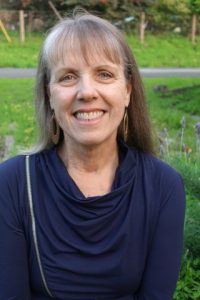 Famous American motivator Joanne Bond gives advice about how to cope with depression during the coronavirus outbreak
Famous American motivator Joanne Bond gives advice about how to cope with depression during the coronavirus outbreak
Long isolation is bad for our psyche and we can easily lapse into depression. The inability to make physical contact with relatives, friends, colleagues or other people we normally communicate with is creating discomfort and disharmony in our daily lives. We have to tune into the new realities and reorganize our routines in order to find other useful things to do at home. Instead of feeling down for not being able to do the usual, we should change the focus and find new forms of expression.
That is precisely why I spoke to the famous American motivator – Joanne Bond. For 30 years she’s been coaching business leaders and augmenting their professional skills. She consults start-ups and some of the most successful entrepreneurs. She conducts seminars for women who are going through life changes. Joanne’s approach revolves around emotional intelligence, self-awareness, self-control and resilience – all of them – qualities that contribute to success in life and at work. Joanne’s experience includes projects in the healthcare sector and science. She holds a master’s degree in communication psychology and is a coach certified by Hudson Institute of Coaching in California. Joanne Bond visited Bulgaria in 2018 as part of the Bulgarian Entrepreneurship Center’s mission.
How did your life and job change under the conditions of the coronavirus crisis?
Quieter. Calmer. Home-based. No travel. Focused on daily living with my husband, cooking, grocery shopping, exercising, listening to music, reading, watching TV and working. In some ways it’s exactly the same but more restricted. And more emotional when I worry about getting the virus or what the future may bring.
My work has definitely changed. I am an executive leadership coach, trainer and facilitator. Coaching clients – both individual and teams – continues by teleconference, but no in-person sessions. Clients still want to keep their development initiatives moving forward yet their work has been redirected to the shifting priorities. For example, some have been re-assigned to rotate through Emergency Operations Centers. All my customized in-person training classes that I provide to clients have been cancelled or postponed until clients can determine if/when they will be providing this content virtually. All retreat and meeting facilitations are being delayed. With some clients, I am currently working to re-create training modules and topic-specific meeting facilitations, especially with teams.
Do you coach clients online and what problems do they have for turning to you?
Each client has their unique set of development goals and challenges. Many continue to be focused on work and leadership development and are staying the course. At the same time, they are now having to integrate homeschooling, remote work (telework) for themselves and their staff, virtual meetings, daily changes, etc. All of these changes are creating additional stressors. And forcing the need to adapt as quickly as possible to a shifting landscape, both professionally and personally. So, their well-being and stress management have become much more of a focus for them, their families and their organizations.
What advice do you give them? Could you give us some strategies for surviving the crisis?
Stay present. Be self-aware of your emotional landscape. Understand and acknowledge your feelings, which are neither right nor wrong. Feelings are personal. Knowing how you feel will help you make your best choices for action for yourself and your relationships especially during this stressful time. Practice empathy and compassion for yourself and others. Everyone is having their own, unique experience of this pandemic. Take care of yourself. Build and sustain your resiliency. (Resiliency is the ability to bounce back after setbacks.) Stay focused on your health and energy so you can continue to do the things you need to do during this time and have the fortitude to continue after the pandemic. Health is of the utmost importance now. For me, I stay healthy and gain energy by exercising. I’ve been doing virtual yoga and cardio classes. I’ve also tuned into guided mediations online sessions. Many of these offerings are free or low cost. My clients talk about meditating, working out, playing board games with the family, singing or playing a song each day and posting on Facebook, and other creative ways to manage stress.
Do you advise us to make plans for the near future, for example June, or is it better to take it one day at a time?
Trying to predict the future is difficult and impossible. I feel that planning helps many of us cope with uncertainty and gives a sense of control. So, if you want to plan and it makes you feel better, do so. Balance your budget, map out your next career steps, learn something new that prepares you for what you want to do. Envision how you want June to look and feel. Explore your options if this energizes you. Imagine your next, best future. That being said, I believe there is a lot of power in being present. Being present in the moment gives you the opportunity to deepen your understanding of yourself. To know yourself better. Ask yourself, how am I feeling and why do I feel this way? What can I learn from this? This is how we grow and develop into a much more self-aware human being. And this is the gift we can give to others in our lives. Our presence. We all need support now. And we all need to be present for each other, to listen, love and care.
A lot of people live by themselves and isolation is especially difficult for them. How can they cope better?
Reach out and connect to others. Many people are using virtual platforms (i.e., Zoom) to get together with friends for a virtual social hour, for example. Or connecting with people using FaceTime instead of just texting. It’s nice to see other people’s faces, so more photos are being exchanged. I’ve noticed that we’re reaching out to family and friends to see if everyone is OK, whereas we may have gone longer periods of time between contact. It is comforting to hear others’ voices. If you feel that you are struggling, contact your healthcare professional for advice. This is not my area of expertise.
You mentioned to me that it would be a good idea to form online groups for mutual aid. How do they function and do they help?
See answer to question above. I am aware that there is a lot of social media use occurring in all different platforms. I don’t know if online groups are helping or not. The answer would be unique to each person.
What personal benefits can we extract from the coronavirus situation? Where’s the silver lining?
Personally, I feel that this time in our lives is an opportunity to pause and notice the impact of the pandemic on your life. It can be tough to look at this and feel the changes, but I think this is where the beginning of a much better future can be for us all. This is our time to imagine what’s possible. We are becoming more attuned to the value of our healthcare workers and their needs, appreciative of teachers and the role they play in educating our future leaders, housing the homeless, shopping for our neighbors who can’t go to the grocery store, supporting our restaurants by eating take-out food from them, and so on. Even though we are physically distanced, I feel that socially we still yearn to connect and are finding ways to do so. In my experience, I’ve observed that we seem to be at our best selves in a crisis. And I think that this pandemic is showcasing this as well.
Joanne, thank you for this interview! All the best and good luck.
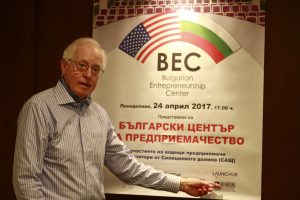 The story of BEC – “The Bulgarian Entrepreneurship Center”
The story of BEC – “The Bulgarian Entrepreneurship Center”
In 2008 Larry Biehl and his wife, Maggie Kritzer, financial advisors and investment managers from Silicon Valley, created the InterCulture Foundation. They travelled around the world in order to discover interesting places where they could create “common spaces between cultures in a culturally competent way”.
In 2014 Larry discovered Bulgaria and fell in love with it. Being a fan of cowboy poetry, he decided to bring to the Balkan country a group of authentic American cowboys and Native Americans who performed their songs and recited their poems. The show travelled to ten Bulgarian cities and was a huge success. The second visit of Larry and Maggie was a fact-finding mission in which they collected valuable information and visited historic sites.
Larry’s interest in ancient history resulted in several projects connected with history and archeology. He met with leading Bulgarian historian, Prof. Bojidar Dimitrov, director of the National History Museum, and explored ancient Bulgarian sites: the Bulgarian capital Pliska, ancient tombs in Kazanlak, ancient Plovdiv, Roman baths in Varna, the medieval fortress Tsarevets in Veliko Tarnovo and one of the oldest settlements in the Balkans – Perperikon near Kurdjiali.
He met with mayor of Sofia, Yordanka Fandakova, with deputy-mayor for culture and education, Todor Chobanov, and minister of culture Vejdi Rashidov.
In the field of archeology Larry established contact with the Balkan Heritage Foundation.
On his next visit to Bulgaria he was accompanied by Douglas Pica, founder of one of the most successful mortgage companies – Provitech. Doug was on a mission to hire IT specialists for his Bulgarian office. He and Larry visited all the leading academies in the software field.
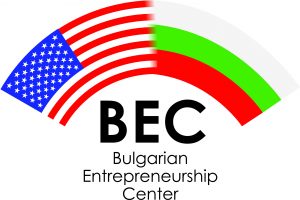 Since 2017 Larry’s focus has shifted to entrepreneurship and education. He was instrumental in creating the Bulgarian Entrepreneurship Center (BEC) Foundation.Its goal was to promote entrepreneurship throughout all elements of society and to develop a permanent educational connection that can ultimately lead to American investment and funding for Bulgarian-inspired projects in different areas. “Entrepreneurship is a verb, not a noun – not a state of being but a continuous state of becoming”, says Larry in one of his interviews. BEC’s mission is to help Bulgarians develop an entrepreneurial ecosystem and to encourage and support inspiring Bulgarian entrepreneurs. “We would like to inject entrepreneurial spirit and skills into the Bulgarian DNA in order to inspire and enable people to prosper and serve their community”, Larry continues.
Since 2017 Larry’s focus has shifted to entrepreneurship and education. He was instrumental in creating the Bulgarian Entrepreneurship Center (BEC) Foundation.Its goal was to promote entrepreneurship throughout all elements of society and to develop a permanent educational connection that can ultimately lead to American investment and funding for Bulgarian-inspired projects in different areas. “Entrepreneurship is a verb, not a noun – not a state of being but a continuous state of becoming”, says Larry in one of his interviews. BEC’s mission is to help Bulgarians develop an entrepreneurial ecosystem and to encourage and support inspiring Bulgarian entrepreneurs. “We would like to inject entrepreneurial spirit and skills into the Bulgarian DNA in order to inspire and enable people to prosper and serve their community”, Larry continues.
Many of BEC’s programs are conducted by leading entrepreneurs from across America – from Tech Valley to Silicon Valley – to create a “bridge” between Bulgaria and the United States for the exchange of knowledge, expertise and resources. BEC provides education in entrepreneurship at different levels.
Teenovator is a project for high school students who would like to become entrepreneurs, who have interesting ideas and would like to turn them into profitable start-up projects. Teenovator was created in 2018 and has been conducted in 17 schools in 3 Bulgarian cities. It is supported by EU commissioner for innovation, education and youth – Maria Gabriel.
My Own Business Institute (MOBI) provides entrepreneurial education for small and family businesses. It is an online course provided by Santa Clara University, California. Director of the program, Andrew Starbird, together with manager Trish Kalbas-Schmidt, visited Bulgaria in order to supervise the education process. Bulgaria now has more than 200 graduates of the MOBI courses.
The Master in Entrepreneurship (MIE) program is a 2-semester academic course held at Varna Free University with the participation of leading lecturers from Silicon Valley. The program utilizes educational material based on courses in Stanford and Massachusetts Institute of Technology. The first 30 graduates successfully presented their projects before international investors.
Larry’s visits to Varna inspired the creation of the Smart Varna Foundation (SMF), a nonprofit entity, designed to encourage entrepreneurship in the area. It was established in mid-2019 and has initiated a variety of projects as well as international forums. The foundation facilitates the dialogue between the public and the private sector, promotes innovation in industries, ranging from healthcare technologies to conservation of the local cultural heritage and social services. It also created the co-working space Switch – a newly found hub for proactive thinkers to exchange know-how and ideas.
University Innovation Fellows (UIF) is an innovations training program, part of the Stanford Design School, California. Its creators, Leticia Britos Cavagnaro and Humera Fasihuddin, visited Bulgaria to identify talented professors and students who would benefit from it. It will help them to develop leadership skills, creativity and self-organization within the institution they study in. As a result of the program, three Bulgarian professors and two groups of students completed the training at Stanford University.
Arc Academy (AA) is a practical course that educates future designers for the gaming industry. It features lecturers from Pixar and other famous computer animation companies.
Pragmatic Marketing (PM) is a three-day intensive and practically oriented course focused on technology companies and entrepreneurs who would like to improve their professional skills. Numerous employees of Google, Amazon, Facebook and other successful companies have completed it. PM was held in Bulgaria and was conducted by one of the leading lecturers – Richard Nutinsky. Thirty Bulgarian entrepreneurs have graduated with an exam.
Norman Winarsky Master Class is a compressed short course aiming at creating and building break-through ventures. It is held by Norman Winarsky – president of SRI Ventures at SRI International and creator of the virtual voice assistant SIRI. The course was attended by 30 top Bulgarian entrepreneurs who graduated with a certificate.
BEC also organized other master classes, workshops and seminars in the field of entrepreneurship, as well as inspirational lectures by prominent mentors, such as Joanne Bond.
Apart from education and entrepreneurship, Larry has started projects in many other fields in Bulgaria. His interest lies especially in social services. He has introduced the concept of the Development Impact Bond (DIB), where impact investors partner with philanthropists to fund social service organizations (NGOs as well as commercial companies) to achieve specific, pre-agreed upon goals, as follows:
- The impact investor and philanthropist agree upon a social problem that needs to be solved,
- The impact investor puts up the risk capital the selected service companies require to enable them to solve the problem,
- The service companies then do the work necessary to achieve the desired and measurable results, and
- The philanthropist pays the impact investor back his invested capital (plus a small return) if and when the results are achieved.
The result of such a partnership is 1) the impact investor has an opportunity to achieve a desired impact and a small rate of return, 2) the service company receives the necessary capital to successfully deliver the desired results (without incurring a debt or diluting its ownership) and the philanthropist only pays for the desired results, not simply earnest effort: truly a “win-win-win”.
Another social project created by Larry was conducted at the Sofia Residence Hotel in Bulgaria. Its employees donate several hours of their time each month to help elderly or disabled people. In so doing, the employees/volunteers not only help their local community, but breed a family relationship that strengthens their common bond to one another and their employer.
In the interest of future projects, BEC also established contact with the Four Paws Foundation, which trains guide dogs for the blind.
Larry’s interests lie in medicine as well. He researched the possibility of developing a vaccine in Bulgaria which will help patients with Parkinson’s disease. The substance is extracted from tobacco leaves and will diminish debilitating symptoms of neurological conditions. The technology used is called Biopharma and could be introduced in Bulgaria too.
Another progress in the field of medicine could be achieved by the presence of leading American pharmaceutical expert Michael Bigham. He has developed cancer treatment medication as well as some of the newest and strongest antibiotics. Mike will visit Bulgaria in the future and will participate in several projects.
Larry has also developed strategies in the field of tourism. He attended an industry forum held at the Ministry of Tourism and opened by minister of tourism Nikolina Angelkova. Larry visited one of Bulgaria’s premium resorts, Albena, and established contacts with the management. He invited Bob Burke, one of America’s leading restaurateurs and tourism professionals, to visit Bulgaria. Bob is a master of strategic decisions, financial analysis and investments. He is behind the success of many American tourism establishments and will visit Bulgaria soon.
BEC has also made an attempt to support Bulgarian sport by inviting American football legend Jamie Williams to Bulgaria. He is a champion with the San Francisco 49ers and a successful entrepreneur. He held a motivational speech at the stadium of one of Bulgaria’s leading soccer teams – Levski. He inspired the players and prepared them for an important match.
Last but not least, Larry’s interests lie in culture. Being a fan and admirer of cowboy poetry, Larry is a music lover and open to different kinds of culture. He also supported Sofia Singer Songwriter Fest (SSSF), an international festival dedicated to acoustic music and poetry, held in Sofia at the end of September. SSSF has been a huge success and has been running and growing for three years.
A highlight of Larry’s work in Bulgaria was meeting president Rumen Radev, who expressed willingness to support BEC’s projects in the future.
To be continued…
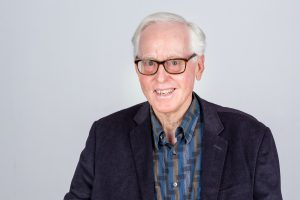 Larry Biehl, founder of the Bulgarian Entrepreneurship Center, on a flying visit to Bulgaria, February 19-23, 2020
Larry Biehl, founder of the Bulgarian Entrepreneurship Center, on a flying visit to Bulgaria, February 19-23, 2020
Larry Biehl, founder and benefactor of BEC, will visit Bulgaria again, between February 19th and 23rd. He is invited to give a lecture on “social innovations”, during the Innovation Explorer conference, held in Sofia on Thursday, February 20th, 2020 at Sofia Event Center. Larry’s speech will be at 15.00 h, during a panel discussion on “Investment and Social Innovation Growth”, together with speakers Martin Petrov, Daniel Lorer and Pavel Ezekiev.
“Bulgarian citizens must be taught how to invest in their communities, if they expect their personal livelihoods to improve”, Larry said once to an interviewer from Bulgarian national TV.
He continued: “Communities throughout the country should know by now that the government is not going to make their lives better, it’s left to them to improve their local circumstances by creating a “connectivity” between 1) each citizen who has demands which must be met, 2) members of the business community that provides citizens goods and services, and 3) social services such as medical care, hospitals, security through police and fire protection, and elder care that take care of us when we are in need. Creating “shared wealth” among all community constituents is a “good thing”: supporting and investing in local businesses; improving schools, hospitals, and public facilities; using our unique skills and capabilities to benefit the “common good”. We must return to the old, time-honored-belief that “communities are like families”, interdependent groups of people (hunters, gatherers, carpenters, farmers) who spent their time doing what each could to enable their “tribe” – and, in so doing, themselves – survive and even thrive.”
Larry explained further: “Today, people spend too much time trying to isolate themselves from one another, be concerned about their own lives rather than the lives of their “extended families”, their communities. Silicon Valley, when I moved there to go to school in 1963, was a group of small towns surrounded by apricot orchards. But because 1) students came out of Stanford’s Electrical Engineering Department eager to innovate and experiment, 2) the university supported this experimentation by sharing intellectual property rights and research and development activities, 3) the population wanted to support these new innovations by investing money in new start-ups to deliver them these new and exciting products, and then, 4) investors persuaded new businesses to donate a portion of their stock to a Community Foundation to fund the expansion of hospitals, municipal services, police protection and other social services, Silicon Valley has grown to be the wealthiest and best served community in the United States.”
You may hear Larry’s whole lecture during the Innovation Explorer Forum 2020. For more information please visit: https://innovationexplorer.bg/
Larry Biehl is a financial consultant and investment manager with more than 50 years of experience in Silicon Valley. He is a co-founder of two successful investment management firms and has an extensive background in asset management, personal finance management and marketing. Larry is an avid promoter of the local innovation ecosystem and a founding member of the Bulgarian Entrepreneurship Center (BEC) which seeks to motivate and encourage entrepreneurship in Bulgaria. Larry holds a Bachelor of Arts in English Literature and Medieval History and a Master’s degree in Finance, both from Stanford University.
His upcoming Bulgarian visit will also include a trip to Varna, where Larry will observe the progress of BEC’s projects: the MOBI entrepreneurship educational program and the SmartVarna Foundation. During his stay in Sofia, he will meet with representatives of America for Bulgaria foundation, Arc Academy, Telerik and many more.
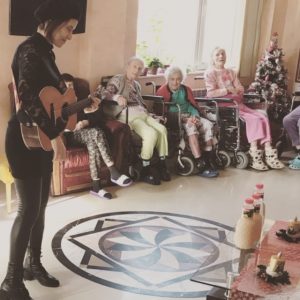 Lilly Drumeva made the elderly happy by giving a concert at the Leonardo da Vinci hospice
Lilly Drumeva made the elderly happy by giving a concert at the Leonardo da Vinci hospice
Lilly Drumeva-O’Reilly, the famous Bulgarian country singer, radio host and representative of the Bulgarian Entrepreneurship Center foundation, took part in a charity project aimed at the elderly, by giving a concert at a Sofia hospice.
The idea came to Svetla Ivanova, manager of the Sofia Residence Hotel, whose staff has been devoting their time to helping the elderly for a year now. “We decided to do something different outside the hotel apart from the care my colleagues provide to handicapped, visually impaired and ill people. We wanted to make them happy and we chose a suitable hospice where they are a bit isolated and to let them experience something that they usually don’t as part of their daily routine, bringing a pleasant variety. I want to especially thank Lilly Drumeva-O’Reilly. Nowadays the hardest thing to do is to make someone happy, this is why we have to continue to positively surprise people in this hospice or another”, shared Svetla Ivanova, manager of Sofia Residence Hotel.
Lilly Drumeva-O’Reilly performed her original compositions, classical country hits and Bulgarian national songs in the foyer of the Leonardo da Vinci hospice before patients and staff.
The event was followed by a cocktail party and a meeting with the hospice director, Doctor Marinova. During the conversation she shared: “We have been doing this for ten years. We don’t own the building, we pay rent. We want to thank you for this nice event that you made for us. All the elderly people here really enjoyed it, some of them even sang along and were genuinely happy. It’s just that some of them could not express what they felt”.
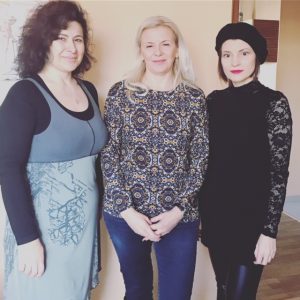 When asked about what diagnoses the residents have, Doctor Marinova answered: “Unfortunately, most of them have serious diagnoses, they are cancer and stroke patients. A small part are lonely elderly people who have no one to look after them. We are a private hospice, admissions are made after a phone conversation, after which we organize a meeting with the patient and their family. The staff is comprised of 18 people, I am the medical director and we have another doctor who is here from Monday through Friday. The conditions here are excellent, the care we provide is tailored to individual needs and we have rehabilitators. There are state institutions of this type as well but the regulations there are different and the waiting period is long.”
When asked about what diagnoses the residents have, Doctor Marinova answered: “Unfortunately, most of them have serious diagnoses, they are cancer and stroke patients. A small part are lonely elderly people who have no one to look after them. We are a private hospice, admissions are made after a phone conversation, after which we organize a meeting with the patient and their family. The staff is comprised of 18 people, I am the medical director and we have another doctor who is here from Monday through Friday. The conditions here are excellent, the care we provide is tailored to individual needs and we have rehabilitators. There are state institutions of this type as well but the regulations there are different and the waiting period is long.”
When asked about what patients need, Doctor Marinova answered: “There are many problems. The number of seriously ill patients that are admitted here is increasing. We need more hospital beds, antidecubitus mattresses and aspirators among other things. We have a website – http://www.hospicedavinci.org/ – and we are open to receiving donations. We can arrange meetings with donors at any time. In the summer the mood is lighter because we have a beautiful garden. We grow roses, we take out benches and pavilions, there is plenty of greenery and the day is longer. Maybe, when the weather gets warmer, you could give an open-air concert in the garden. It would be great if this initiative continued.”
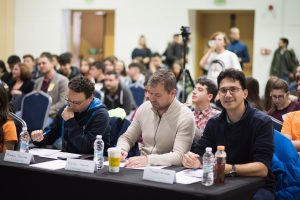 Teenagers from 17 schools in three cities presented their start-up ideas before investors in a two-day competition
Teenagers from 17 schools in three cities presented their start-up ideas before investors in a two-day competition
The European Commissioner for Innovation, Research, Culture, Education and Youth – Mariya Gabriel – opened Teenovator’s start-up weekend
Climate change, bee rescue, sustainable construction, healthy eating at school, disaster reduction, online private lessons, hemp instead of plastic. These are some of the topics and problems that teens in the 10th and 11th grade were looking for a solution to within 48 hours in the startup weekend of the startup club program of Bulgarian schools – Teenovator. For the first time, the event brought together about 250 students participating in startup clubs from 17 schools in Sofia, Varna and Vratsa, mentors in the program and a jury of investors. The purpose of Teenovator startup weekend is to build on the soft skills project from the beginning of the school year, to stimulate students to approach a problem that they are interested in by interpreting a standard business model in a new way. The event was held in Sofia Tech Park.
“In Europe, in the 18-24 age range, 25% of people say they want to develop an idea of theirs into a business. In Bulgaria the data show under 10%. I am sure that together we can make this starting position into an unlimited opportunity, because you, young people, are our hope and pride”, the European Commissioner for Innovation, Research, Culture, Education and Youth – Mariya Gabriel – said. “Teenovator is an example of how the ideas of young people in Bulgaria can be supported”.
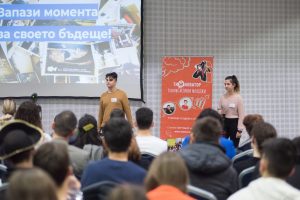 Dr. Boyko Takov, Executive Director of the Executive Agency for Promotion of Small and Medium-Sized Enterprises, also spoke welcoming words, and the Deputy Minister of Education and Science, Engineer Tanya Mihaylova, was the official guest on the second day of the competition. Twenty guest mentors from various business fields, including ultramarathoner Krasi Georgiev and former Pixar artistic director Antoni Hristov, took special part with lectures and team assistance.
Dr. Boyko Takov, Executive Director of the Executive Agency for Promotion of Small and Medium-Sized Enterprises, also spoke welcoming words, and the Deputy Minister of Education and Science, Engineer Tanya Mihaylova, was the official guest on the second day of the competition. Twenty guest mentors from various business fields, including ultramarathoner Krasi Georgiev and former Pixar artistic director Antoni Hristov, took special part with lectures and team assistance.
The students presented to the jury of investors and partners about 30 startup ideas, most of which will be developed in a startup business for the final race in May. Investors Milen Ivanov, CEO of Angel Club, Momchil Vasilev of Endeavor and Rumen Iliev of LauncHub were part of the jury. A special jury included Zlatina Baleva, Program Expert at the America for Bulgaria Foundation, Victoria Blazheva, Director of Communications at UniCredit Bulbank and Hristo Boyadzhiev, founder of the Tuk-Tam organization. They voted in the categories of green idea, social innovation, sustainable business model and more.
“Teenovator is an opportunity for students to upgrade their knowledge and skills acquired at school with business thinking, presentation skills, design thinking, but most of all – to participate in creating a new community and to acquire this knowledge for a year from real business representatives and entrepreneurs”, Svetlana Savova, head of Teenovator in Bulgaria said. “For some of the students in the program’s first year, their participation in Teenovator was a determining factor for their choice of major at university”.
PARTNERS
Teenovator is implemented with the support of the Bulgarian Entrepreneurship Center (BEC). The America for Bulgaria Foundation supports the clubs in the two Vratsa schools. The project is part of the accelerator program of Reach for Change – The Change for 2019. UniCredit Bulbank is also a partner of Teenovator for the school year of 2019-2020.
About Teenovator
Teenovator has been piloting in Bulgaria since the beginning of the 2018-2019 school year, when four capital city schools participated in the program. For 2019-2020 Teenovator is already in 17 schools in three cities – Sofia, Varna and Vratsa. The project focuses on stimulating students’ creative thinking and developing their entrepreneurial skills. Mentors who are entrepreneurs in start-up and developed companies in Bulgaria and with experience in various fields, help students in grades 10 and 11 to find their passion and turn it into a profitable start-up project. For this school year 34 mentors have been included in the program. Teenovator’s teaching methodology was developed based on successful practices from Stanford University. The program is implemented in nine countries on three continents and Bulgaria has been part of it since the school year of 2018-2019.
The Headstarter platform for the announcement and finding of internships, which was created by students in the Sofia Mathematics High School, won first prize at the final competition for the first year of Teenovator – 2018-2019. The prize for the winner of the national competition in our country was participation in a special accelerator program in Slovenia from 25 to 30 June 2019 and participation in the international event at the Presidential Palace in Ljubljana on 9 September. Five of the ten start-up projects from the first year continue to develop as companies, and some of them already have investor funding proposals.
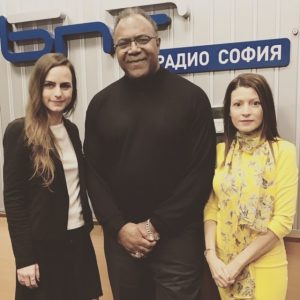
Jamie Williams, mentor of BEC, visited Bulgaria again
The American football star and famous entrepreneur Jamie Williams visited Bulgaria again in the period November 4 to 16, 2019, as part of BEC’s mission. His visit included numerous lectures, classes, business meetings, consultations of start-up companies and various media appearances. The aim of Jamie Williams’ visit was to encourage Bulgarian business, to motivate young entrepreneurs and to improve their leadership skills.
The events took place in Sofia and Varna. In the first days the American football legend gave interviews to leading Bulgarian media like the Bulgarian National Radio, Darik Radio and TV Evropa among others. Next came consultations with companies in the IT branch – Office R&D and Leanplum. Jamie Williams also held a lecture on the topic of Leadership at Telerik Academy.
He visited Boyana Film Studios as well, where he made useful contacts for future partnerships in the film industry. Jamie Williams, in addition to being a champion of American football and entrepreneur, is also a film producer, actor and screenwriter. He wrote one of the most emotional speeches in American cinema, which Al Pacino gives in Oliver Stone’s Any Given Sunday.
Jamie Williams also held a special motivational seminar during his stay in Bulgaria. It was dedicated to the Levski football club and the entire team was present, as well as the coaches and management. The event was covered in various media. Jamie Williams motivated the Bulgarian footballers by telling them about how an athlete can continue to be successful even after the end of their professional career and about how profits can be made from sport. But the focus of his lecture was the creation of successful teams and leadership.
In Varna Jamie Williams opened new co-working spaces, gave a lecture at the Varna Free University, gave a presentation at the Cherno More Hotel for Entrepreneurs’ Day and visited the old Bulgarian capital of Pliska.
The American mentor went to Plovdiv as well, where he saw a basilica restored by the America for Bulgaria foundation.
Follow our website for additional information https://foundationbec.org
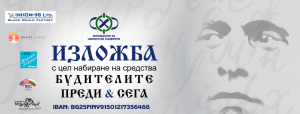 A charity exhibition and auction to support young talents in Varna
A charity exhibition and auction to support young talents in Varna
On 1 November 2019 at 19 h in the sea casino Varna gallery, the official opening of the exhibition entitled “National Leaders before and now” will be held. The exposition will be available until 10 November and will include works by young Bulgarian artists.
This is the second edition of this exhibition devoted to the national revival spirit and work. The young artists’ works will be sold at an anonymous auction and the funds raised will be used to create an online platform to support and help realize talents – FineАrtStage.com.
The organizer of the charitable exhibition is Foundation for Total Development. Delyan Todorov, an artist from Varna and the foundation’s CEO, and his team believe that talented people are a national treasure and must be supported and encouraged to develop their abilities and potential. Through the Fine Art Stage platform the organization intends to help at least five young artists within twelve months. The platform aims to provide mentorship support, art supplies, promotion and cooperation with future exhibitions.
The “National Leaders before and now” exhibition was realized with the support of INHOM 98 Ltd., Smart Varna Foundation and the Wild Art shop.
Here you can see our Facebook event:
https://www.facebook.com/events/395239914498962/
Best regards,
Delyan Todorov
CEO of Foundation for Total Development
Tel. 0893 76 93 78
 Enrolment to begin into the second year of the exclusive entrepreneurship program in the Varna Free University
Enrolment to begin into the second year of the exclusive entrepreneurship program in the Varna Free University
The program was designed by Silicon Valley lecturers with the support of BEC (Bulgarian Entrepreneurship Center)
During the past year something new happened within the entrepreneurship field in Bulgaria. New graduates entered the field – the first ones who completed the Master’s program in entrepreneurship in Varna (a joint project by the Verna Free University “Chernorizets Hrabar” and BEC (Bulgarian Entrepreneurship Center).
The program is the paragon of the new mentoring model in Bulgaria to encourage young and talented people to work and develop within the country. The program utilizes educational materials based on courses in Stanford and MIT (Massachusetts Institute of Technology).
The first 30 graduates successfully presented their projects before international investors and business representatives, among whom were Larry Biehl – an American financial consultant and investment manager, initiator and mentor of the program, Michael Marvin – one of the founders of Tech Valley in New York, as well as the Innovation Accelerator Bulgaria and BrightCap Ventures investment funds.
The startup projects inspired by the practical orientation of the Master’s program in entrepreneurship are already taking their first real steps in the business. Within two semesters the course transferred the best practices of Silicon Valley lecturers to Bulgaria, as well as the experience of world-famous entrepreneurs and practice.
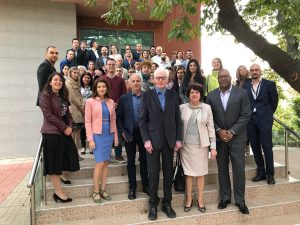 The courses in the following academic year will again be taught by some of the most successful entrepreneurs with experience in deals in the USA, Bulgaria and the world. Among the Bulgarians who will be teaching, notable names of high managers with successful foreign careers stand out.
The courses in the following academic year will again be taught by some of the most successful entrepreneurs with experience in deals in the USA, Bulgaria and the world. Among the Bulgarians who will be teaching, notable names of high managers with successful foreign careers stand out.
Michael Marvin, one of the founders of Tech Valley in New York, shared that he is teaching students of the opportunities that lie in taking full advantage of the entrepreneurship ecosystem potential when creating their products and services for the market. “You have brilliant young people in Bulgaria – encourage them!” he said.
The focus of this year’s education will fall on social entrepreneurship, which blends the resourcefulness of the business with a social mission, the skillful combination and balance of social and economic goals with a good understanding of the needs of people.
Partial scholarships will again be given to the best candidates by the Varna Free University and business in the region. The courses under the program are all taught entirely in English.
To apply for enrolment and to register, go to entr.vfu.bg
About the organizers:
The Verna Free University “Chernorizets Hrabar” is the biggest private university in Bulgaria. It is an established academic center that educates Bulgarian and foreign students alike, giving them knowledge in fields prioritized in the country, and creates an internationally convertible and competitive scientific and academic product. Over ten thousand students study there under more than 67 Master’s and Bachelor’s programs and 29 PhD programs.
BEC (Bulgarian Entrepreneurship Center) was created in April 2017 by a group of inspired entrepreneurs. BEC is a program by the InterCulture Foundation, an NGO located in the San Francisco Bay area in California. To this group of inspired people, among whom are Larry Biehl, Norman Winarsky, Vassil Terziev, Bogomil Balkansky and Dafina Toncheva, “entrepreneurship” is s verb and not a noun and also not a passive state but a dynamic process of constant development and construction.
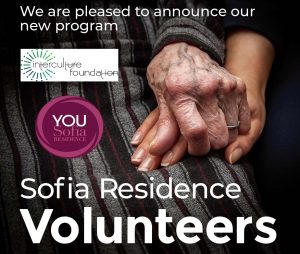 Sofia Residence Hotel started a social project to help elderly people
Sofia Residence Hotel started a social project to help elderly people
One of the partners of the Bulgarian Entrepreneurship Center is Sofia Residence Hotel in Sofia. Larry Biehl, the founder of the foundation, and the lecturers he brings from the United States often stay there.
The small boutique hotel offers comfort and coziness, emphasizing a personal touch when it comes to its clients. Recently the hotel manager, Svetla Ivanova, together with the Bulgarian Entrepreneurship Center, launched a social project aimed at supporting the lives of elderly people and people with disabilities. Recently, guests have become more and more demanding and they care about what the management of the place where they stay is. Only comfort and good services are not enough and the competition is great.
A new trend is for hotel staff to engage in social causes, such as in their spare time to help elderly people, people with disabilities, children in need, and others. The task of a good manager is to motivate her employees to participate in such projects. They donate part of their spare time free of charge, in the evening or on the weekend by working as volunteers, contributing to society.
In turn, more and more people prefer to stay in hotels whose management is dealing with such initiatives. Thus, staying there, they help them. Their money goes to this hotel, which, in addition to providing good services, also performs good deeds.
This is precisely the essence of the pilot project, which started at the beginning of 2019 at Sofia Residence Hotel. The campaign was opened in mid-January with a concert by Lilly Drumeva, attended by hotel owners, staff and many guests. Since then, Sofia Residence employees have spent many hours of useful work helping their elderly neighbors, people with disabilities, disadvantaged children and others.
Yuliana Milanova, for example, regularly reads books to a blind neighbor. Victoria Dukova buys groceries for a 92-year-old neighbor twice a week. Boris Barkev donates clothes and food to homeless people in the neighborhood where he lives. Vasya Asenova regularly cooks and cleans the house of an elderly man. Mimi Tseneva takes care of a 30-year-old boy suffering from schizophrenia. There are many examples.
The hotel director, Svetla Ivanova, regularly holds meetings with the staff, who share their experience and offer new ideas for useful work. Customers, for their part, understand these initiatives through a brochure in each room. There they can read in detail about all hotel social activities and make a donation.
In the United States, more and more hotels are following this trend. The Bulgarian Entrepreneurship Center supports it and hopes that in Bulgaria, too, the hoteliers will go along this road.
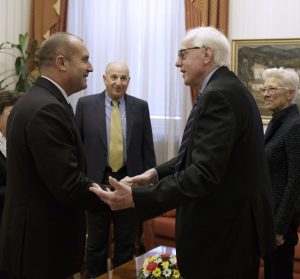 The founder of the Bulgarian Entrepreneurship Center Foundation, Larry Biehl, met the President of the Republic of Bulgaria, Rumen Radev
The founder of the Bulgarian Entrepreneurship Center Foundation, Larry Biehl, met the President of the Republic of Bulgaria, Rumen Radev
On May 9, 2019, a meeting of the President of the Republic of Bulgaria, Mr. Rumen Radev, was held in Sofia, with Mr. Larry Biehl, founder of the Bulgarian Entrepreneurship Center Foundation. There was also Mr. Michael Marvin, a leading technology entrepreneur and lecturer in the Foundation, as well as Margaret Krytzer, a financial consultant, founder of the foundation and Mr Biehl’s wife.
Larry Biehl presented the programs of the Bulgarian Entrepreneurship Center which are currently being implemented in Bulgaria: a Master’s Program in Entrepreneurship at the Varna Free University, Teenovator a high school entrepreneurship program, entrepreneurship training for small and family businesses – MOBI – provided by the Santa Clara University, California, as well as business seminars and entrepreneurship courses conducted by leaders in IT entrepreneurship.
The highlights of the conversation were Creative Thinking, Soft Skills, Critical Thinking, Innovation, Artificial Intelligence, and more. Larry Biehl also told about his plans to visit Bulgaria with a group of adherents called VISTAGE to get to know Bulgaria for the purpose of developing new projects and investments. Larry Biehl set out his understanding of the work of the foundation in detail: integrity, goodness, justice, creative thinking, and other enduring human values.
The President has expressed support for these initiatives and is ready to support a future conference within 1-2 days whose topics will be proposed by Mr. Biehl, as well as funding.
At the cordial and warm meeting, ideas were shared, including interesting stories from the military careers of Mr. Radev and Mr. Marvin.
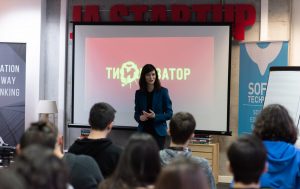 The Bulgarian Entrepreneurship Center supported the first Teenovator program – entrepreneurship training for high school students
The Bulgarian Entrepreneurship Center supported the first Teenovator program – entrepreneurship training for high school students
The Bulgarian Entrepreneurship Center Foundation supported a new program designed to develop entrepreneurship at a high school level. It is called Teenovator and took place between October 2018 and May 2019. It was developed by the ProZnanie Foundation, Bulgaria, in collaboration with the Ustvarjalnik program in Slovenia.
Teenovator started in four elite Bulgarian high schools: Mathematics High School, High School No. 19, No. 105 and No. 32. The teaching began in October 2018. Eighty people in total started the education, fifty of whom continued and graduated. Teaching was held after school hours at 7h in the evening, once a week. The mentors were young people who had started their own businesses. Teenovator has all the licenses and permissions from the Ministry of Education and the Regional Inspectorate.
In January 2019, Teenovator organized a mid-term event called Startup Weekend. It took place at Sofia Tech Park and was opened by EU Commissioner Maria Gabrielle. Kids from all 4 schools had to form teams and present their ideas in front of judges.
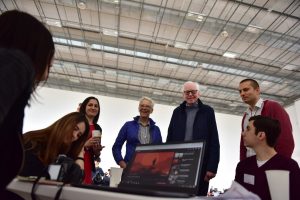 The graduation day was on 10 May. Students had to form teams and present their ideas in front of judges. It was a competition between Bulgarian and Slovenian teams. A train of young Slovenians arrived the day before and the presentation was given in a hall near the central station under the patronage of the Slovenian Ambassador. The team which won was called Headstarter and it comprised students of the Mathematics High School. They had created a training and practice platform to connect students and business. On 24 June, the Mathematics High School team (8 kids) will travel to Slovenia. In September, they will attend an international competition under the patronage of the president of Slovenia.
The graduation day was on 10 May. Students had to form teams and present their ideas in front of judges. It was a competition between Bulgarian and Slovenian teams. A train of young Slovenians arrived the day before and the presentation was given in a hall near the central station under the patronage of the Slovenian Ambassador. The team which won was called Headstarter and it comprised students of the Mathematics High School. They had created a training and practice platform to connect students and business. On 24 June, the Mathematics High School team (8 kids) will travel to Slovenia. In September, they will attend an international competition under the patronage of the president of Slovenia.
The Teenovator program teaches how to develop soft skills. Students get different tasks which they have to master. For example, to take a photo with the mayor or do other jobs which are challenging and require creative skills. They have to overcome their fears, learn how to work in a team, create and develop a business idea, design a business model and plan for execution, learn how to pitch in front of investors.
Future of Teenovator: the goal is to expand the program into 25 more schools in the second year in Sofia as well as 5 schools in Varna. Teenovator is currently looking for funding and is hiring mentors. Please visit their website for more information: https://teenovator.bg/
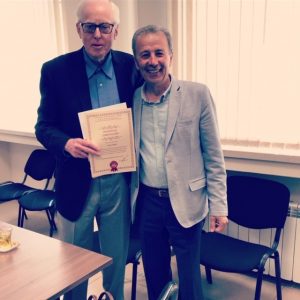 Larry Biehl awarded by the Research and Application of New Information and Communication Technologies Center (RANICTC), Varna Free University
Larry Biehl awarded by the Research and Application of New Information and Communication Technologies Center (RANICTC), Varna Free University
The founder of the Bulgarian Entrepreneurship Center (BEC) Foundation, Mr. Larry Biehl, was awarded a certificate of merit in support of the training of young talents from the IT-field of the Varna University of Economics. The prize was awarded personally by Professor Georgi Zelenkov, founder of the Research and Application of New Information and Communication Technologies Center.
The Fund to support talented students was established 6 years ago by Georgi Zelenkov, Director of the newly-created Research and Application of New Information and Communication Technologies Center (RANICTC), and Professor Avram Eskenazi, a lecturer at the university and a member of the Expert Council at RANICTC.
The purpose of the fund is to support talented students from the Varna University of Economics in the majors of “Informatics” and “Business Information Systems”, who have demonstrated excellent results and remarkable achievements in the field of information and communication technologies.
Fund proceeds are used only for the financial support of talented students.
The idea of creating the fund was inspired by the work of Professor Tsani Kalyandzhiev – a scientist, public figure, humanist and first rector of the Varna Commercial University – now the Varna University of Economics.
In the letter accompanying the donation he made to build the Varna Commercial University building he wrote:
„However, as much as one is lost in the mist of personal happiness, one cannot help but think about higher purposes from the bottom of one’s soul and about the good of the public, to which one owes one’s existence and success“.
Believing that it is time to look beyond the mist of personal happiness, we created this fund to revive the donor spirit. Different people – IT leaders, business people who graduated from the Varna University of Economics, and many others who are in one way or another connected with the university and who share the belief that we are working for a noble cause, have joined us. Contributors who believe that the awards given have less of a financial and more of a spiritual dimension. They believe that the rewarded students will remember this and at some point in their life they will feel the inner need to contribute and help the University and those who follow their path.
This year, one of the major contributors to the fund was Mr. Larry Biehl, a friend and partner of the Varna University of Economics, who received a donation certificate and an invitation to attend the awards ceremony scheduled for December 3, 2018, in Hall 1 of the Varna University of Economics.
Every year, the fund presents a nominal prize of BGN 1000 in the name of “Mois and Ilko Eskenazi” (their names are related not only to the history of the University but also to the history of the city of Varna) and two prizes of BGN 800.
Candidates are selected by a special procedure by the Expert Council of the Research and Application of New Information and Communication Technologies Center and the awards are presented before the Student Feast, by the Rector of the University, at a special ceremony.
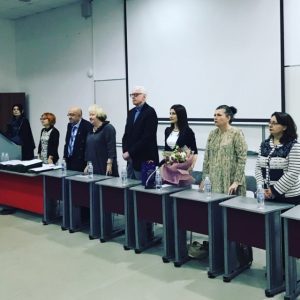 Larry Biehl handed diplomas to talented students from the Varna Free University (VFU)
Larry Biehl handed diplomas to talented students from the Varna Free University (VFU)
On May 17, Larry Biehl took part in the graduation of 175 bachelors and masters from the Faculty of International Economics and Administration of the Varna Free University. During the solemn ceremony, he handed diplomas to masters who achieved the greatest success during their studies from the Data Science majors; European administration and project management; International Finance and International Politics and Security. In his greeting to the alumni, Larry Biehl urged them to set high goals and make the next important step in their lives: “from success to significance.”
Larry Biehl’s meeting with leading companies from Varna and the region on “Mentoring – Small Investment, Big Return” was held later that day. The President of VFU “Chernorizets Hrabar”, Assoc. Prof. Krasimir Nedyalkov, gave Larry Biehl the honorary diploma of the university for his contribution to the development of the new educational model and the creation of a supportive entrepreneurial environment for young people.
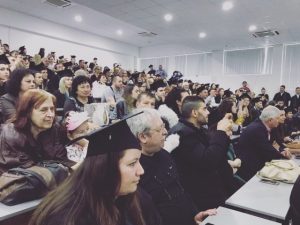 Over 20 companies in the IT sector, road and building construction, chemical industry, services, banks, etc. listened, with great interest, to Larry Biehl’s narrative about the creation and development of an entrepreneurial environment in the Silicon Valley. He paid great attention to the model of mentoring of talented students and startups. Larry Biehl also shared the progress of Master of Entrepreneurship, a joint project of the Bulgarian Entrepreneurship Center and Varna Free University.
Over 20 companies in the IT sector, road and building construction, chemical industry, services, banks, etc. listened, with great interest, to Larry Biehl’s narrative about the creation and development of an entrepreneurial environment in the Silicon Valley. He paid great attention to the model of mentoring of talented students and startups. Larry Biehl also shared the progress of Master of Entrepreneurship, a joint project of the Bulgarian Entrepreneurship Center and Varna Free University.
 The founder of the Bulgarian Entrepreneurship Center Foundation (BEC), Larry Biehl, is to visit Bulgaria again in May
The founder of the Bulgarian Entrepreneurship Center Foundation (BEC), Larry Biehl, is to visit Bulgaria again in May
The founder of the Bulgarian Entrepreneurship Center Foundation (BEC), Larry Biehl, is to visit Bulgaria again in May. This time the reason is his Master’s program in Entrepreneurship at the Varna Free University “Chernorizets Hrabar” supported by the BEC through the participation of leading Silicon Valley lecturers. Among them are Michael Bigham, a pharmaceutical giant and investor, who developed some of the most powerful medication to fight cancer and latest generation of antibiotics, Michael Marvin, a technological guru who has developed more than 100 start-ups on the East Coast, and Larry Biehl, a leading financial expert and consultant, university lecturer and book author, who knows the whole history of Silicon Valley. Larry has managed and invested the money of some of the wealthiest people in California, many of whom come from the technological sector. Larry Biehl has visited Bulgaria many times, starting various projects in the areas of entrepreneurship, education, social services, archeology, tourism and culture.
Since creating InterCulture, Inc. (IC) and InterCulture Foundation (ICF) in 2008, Larry and his wife, Maggie, have traveled throughout the world to discover ways in which these organizations could fulfill their mission. The purpose of both is to create “common space” between disparate cultures in a “culturally competent” way. When Larry identifies a place that could benefit from “common space creation”, he creates a program, such as the Bulgarian Entrepreneurship Center (BEC) in Bulgaria. Larry has worked as a Financial Advisor and Investment Manager for wealthy individuals for over 40 years, founding Bailard, Biehl & Kaiser, inc. with two classmates after graduating from the Stanford Business School in 1969. He co-authored two books and a college textbook, Personal Money Management, SRI and McMillan, 6 Editions (1972-1990) and a self-help book, Personal Profit Series, Dow Jones (1976-1977). Larry has experience working with many non-profit organizations: Alister MacKenzie Foundation, Heart to Heart Foundation, Esalen Institute’s Project for Economic Growth (Russia), Western Folklife Center, American Prairie Foundation, and the da Vinci Society.
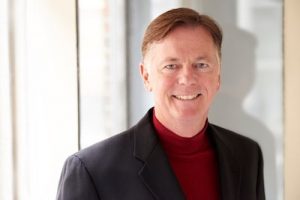 Leading American Pharmaceutical Expert to Visit Bulgaria in May
Leading American Pharmaceutical Expert to Visit Bulgaria in May
In May 2019, Bulgaria will be visited by one of the most successful entrepreneurs in the world pharmaceutical industry – Michael Bigham. He has held managerial positions at some of the largest pharmaceutical companies and developed cancer treatment medication, as well as some of the newest and strongest antibiotics. Michael Bigham is a true guru in the pharmaceutical and medical industry in the USA. Additionally, he is a very successful businessman, entrepreneur and investor.
Pharmaceutical expert Michael Bigham is to visit Bulgaria between May 15th and 20th, 2019, as part of the American lecturers to teach at the Varna Free University “Chernorizets Hrabar” under the Entrepreneurship Master’s program. Others include Michael Marvin, a leading technological expert and entrepreneur in the IT field, and Larry Biehl, the foundation’s boss and a financial expert.
Michael F. Bigham was appointed Chief Executive Officer and Chairman of Paratek Pharmaceuticals’ Board of Directors in October 2014. Mr. Bigham has more than 25 years of senior leadership experience in the biopharmaceutical industry. From January 2003 to November 2015, he was a general partner at Abingworth LLP, a leading international investment group dedicated to life sciences and healthcare. In November 2003, Mr. Bigham became part time Executive Partner at the firm. He currently serves as a member of the board of directors of InMediata and has held several directorships, including at Avila Therapeutics (where he was also the founding Chairman and CEO), Magellan Biosciences, Portola Pharmaceuticals, Supernus Pharmaceuticals, Avedro and Valeritas.
Mr. Bigham was formerly Vice Chairman of Corixa Corporation, a publicly traded biotechnology company, and was President and Chief Executive of Coulter Pharmaceuticals, a publicly-traded oncology company, until it merged into Corixa. Previously, he was an early employee at Gilead Sciences where he served in various capacities, including Executive Vice President of Operations and Chief Financial Officer. Before joining Gilead Sciences, Mr. Bigham was a Partner at Hambrecht & Quist where he became Co-Head of Healthcare Investment Banking. Mr. Bigham received his B.S. from the University of Virginia and qualified as a C.P.A. before completing his M.B.A. at Stanford University.
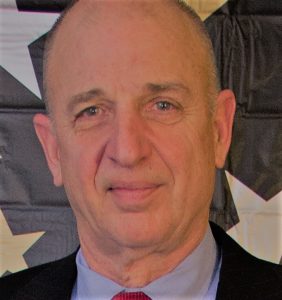 Leading IT expert and entrepreneur, Michael Marvin, to visit Bulgaria for a second time in May
Leading IT expert and entrepreneur, Michael Marvin, to visit Bulgaria for a second time in May
Michael Marvin, a leading entrepreneur in the field of technology, is to visit Bulgaria between May 11th and 16th, 2019. He will be part of a visit by American lecturers who will teach at the Varna Free University “Chernorizets Hrabar” as part of the Entrepreneurship Master’s program. This isn’t his first visit to Bulgaria. In 2017 he was part of the Bulgarian Entrepreneurship Center’s team and participated in various conferences and seminars. Michael Marvin is a real giant in the IT industry. He has founded and developed more than 100 technology companies and is the creator of Tech Valley, the East Coast equivalent of Silicon Valley. He was also an adviser to a $1.4 billion Equity Fund, has occupied managerial positions and been a Board Member in prestigious companies.
Mike Marvin has been actively involved in starting and/or growing more than 100 technology companies – and investing in many of them – over the last 30+ years. He was a founder and first CEO of a startup that went public 7 years later and was ultimately sold to a Fortune 500 company. Also, Mike was an adviser to a $1.4 billion Equity Fund, where he screened the companies to be funded and served on their Boards. He also Founded and helped manage a seed capital fund that invested $10,000 – $100,000 in startup companies concentrated within a 60-mile radius of great universities (Rensselear Polytechnical Institute).Throughout his career, Mike has been a CEO, Chairman of the Board, Board Member, Advisor, and/or an Investor with numerous technology companies located in New York, Florida, Virginia, Connecticut, and Canada.
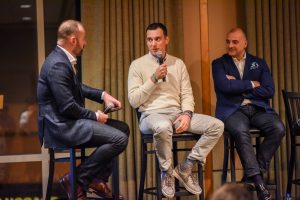
An Event Co-organized by BEC Gathers nearly 500 Bulgarians on the US West Coast in early March 2019
The Bulgarian Entrepreneurship Center (BEC) in partnership with the America for Bulgaria Foundation (www.us4bg.org), The Bulgarian Private Equity and Venture Capital Association (www.bvca.bg) and President Plevneliev’s Solutions for the Future Foundation, organized a major outreach to the Bulgarian diaspora on the US West Coast, in an initiative named RE:TURN.
The partners joined efforts to engage the Bulgarian diaspora in San Francisco, Los Angeles and Seattle, in order to invest in Bulgarian starts-ups or VCs, give back to select NGOs, or consider coming back to Bulgaria.
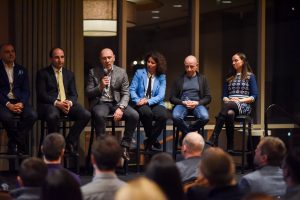 Among the participants in RE:TURN were well-known and respected professionals: Bogomil Balkansky (former Vice President of Google), Momchil Kyurkchiev (Co-founder of Leanplum), Nancy Schiller (President of ABF), Rossen Plevneliev (former President of Bulgaria), Genoveva Christova (President of Ligna), Vassil Terziev (Founder of Telerik), Ivan Dimov (Executive Director of BEC), Larry Biehl (founder of BEC), Evgeny Angelov (chairman of BVCA), Anthony Christov (Founder of IDEA Academy), etc.
Among the participants in RE:TURN were well-known and respected professionals: Bogomil Balkansky (former Vice President of Google), Momchil Kyurkchiev (Co-founder of Leanplum), Nancy Schiller (President of ABF), Rossen Plevneliev (former President of Bulgaria), Genoveva Christova (President of Ligna), Vassil Terziev (Founder of Telerik), Ivan Dimov (Executive Director of BEC), Larry Biehl (founder of BEC), Evgeny Angelov (chairman of BVCA), Anthony Christov (Founder of IDEA Academy), etc.
Anthony is a showcase of a Bulgarian who after a successful career as Art Director for Pixar, creating award-winning films such as Wall-E, Finding Nemo, and The Incredibles, decided to come back to Bulgaria in order to establish IDEA Academy. Set to open doors in September, IDEA will offer courses in game and visual effects design, cinematography, and entrepreneurship.
In March 2019 BEC provided a grant to IDEA Academy to help kickstart the organization.
For more on RE:TURN, please read ABF’s newsletter: https://www.us4bg.org/newsletter/april-2019/
 Another group of Bulgarian teachers trained at Stanford under the University Innovation Fellows program
Another group of Bulgarian teachers trained at Stanford under the University Innovation Fellows program
In January 2019 a second group of Bulgarian teachers went to Stanford University to be trained under the University Innovation Fellows (UIF) program. Among them were Associate Professor Kamen Spasov, Dean of the Mathematics and Informatics Faculty at Sofia University “Saint Kliment Ohridski”, and Victoria Stancheva, assistant at the Marketing Department at the University of Economics – Varna. They spent a few days at the center of the Silicone Valley where they exchanged experience with colleagues and participated in an intensive course in design thinking and developing specific creativity and organizational skills.
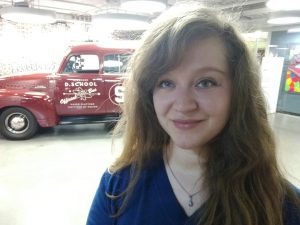
And this is what Victoria Stancheva shared after her return:
‘The program was quite intensive and well-structured at the same time. After each stage and session, we had time to give feedback, summarize what we learned and discuss how we can apply the knowledge at our universities. Interestingly, after going through the stages of design thinking, we had the chance to conduct a training session on the same topic for our students. Our group was comprised of teachers from various contingents and scientific fields (medicine, mathematics, business, military studies, music etc.) and all of us could clearly see the possibilities for applying (in our own work) the instruments and models shown. The environment and facilities at Stanford are centered on the convenience of students and are conducive to innovations. In my work, I shall apply design thinking tools in a start-up competition for high school and university students.’
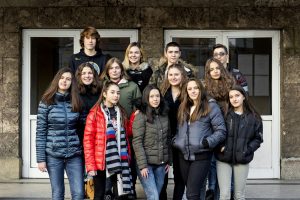 High school entrepreneurship in Bulgaria, supported by BEC
High school entrepreneurship in Bulgaria, supported by BEC
2018 was a good year for the development of entrepreneurship at a high school level. Our partners from the “Proznanie” foundation kicked off a new project named “Teenovator”.
Teenovator are startup clubs for high school students, where they learn how to earn a living by doing what they love and acquire new skills needed for success in the job market of the 21st century.
Teenovator is conducted in Bulgaria since October 2018 and is a part of the USchool international network, whose foundations are based on the Design Thinking concept of Stanford University.
Teenovator clubs are led by mentors, who are young entrepreneurs themselves.
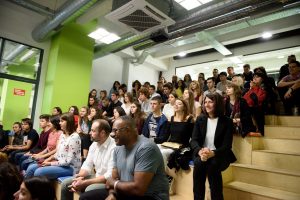 They meet with the students once a week and help them on this journey. Dedicated mentorship and positive encouragement are the key components to our program. The goal of every startup club is to provide a sandbox where students can complete their very first entrepreneurial project – they are guided to start a profitable venture – and through that they gain invaluable experience.
They meet with the students once a week and help them on this journey. Dedicated mentorship and positive encouragement are the key components to our program. The goal of every startup club is to provide a sandbox where students can complete their very first entrepreneurial project – they are guided to start a profitable venture – and through that they gain invaluable experience.
Watch a short video about Teenovator on Bloomberg TV:
https://www.youtube.com/watch?v=ZjaDF63PJeM
https://www.youtube.com/watch?v=u2ILqLq7HI8
For more information please contact Veronica Racheva: vracheva@proznanie.bg, https://teenovator.bg/
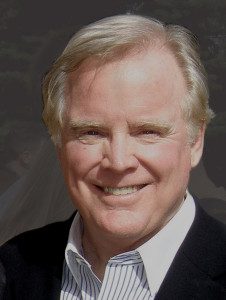 Bob Burke, famous American restaurateur, to visit Bulgaria in May 2019
Bob Burke, famous American restaurateur, to visit Bulgaria in May 2019
In mid-May Bulgaria will be visited by Bob Burke, the famous American restaurateur and tourism professional. He was invited by the Bulgarian Entrepreneurship Center (BEC), to give lectures at leading Bulgarian universities and to meet high-ranking people in the industry. Bob Burke will also hold a two-day seminar about “How to increase the establishment’s turnover and attract more customers”. Very soon the dates and venue for this interesting event, intended for the professionals in the field, will be announced. After completing the course, participants will receive a certificate signed by the famous lecturer. For more information: lili@techno-link.com
Bob Burke is the founder of one of the most successful consulting companies in the field of tourism – Ovation Consulting. He has substantial experience and a star reputation, as leader in the field of hotel and restaurant management. He has developed and made a lot of establishments successful, creating unique products and finding new markets for them. Bob Burke is a master of strategic decisions, financial analyses and investments. He can find the right solution for any client, improving the product quality and marketing. He works in close cooperation with some of the best chefs, such as Michael Chiarello. Bob Burke has been the president of leading restaurant chains – Pat Kuleto Restaurants, Piatti Restaurant Group, Real American Restaurants, Gordon Biersch Brewing Company and others. He is also chairman of the board at the Guide Dogs for the Blind organization. He is engaged in other social causes as well and is a passionate skier and cyclist in addition to being a connoisseur of good food.
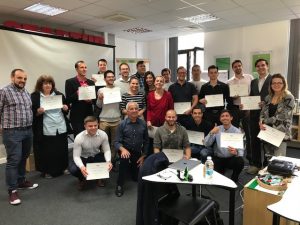 Leading lecturers from Silicon Valley visited Bulgaria in October 2018
Leading lecturers from Silicon Valley visited Bulgaria in October 2018
Between October 15 and 31, Bulgaria was visited by famous professors and professionals from Silicon Valley who gave lectures in the cities of Sofia and Varna, as per Bulgarian Entrepreneurship Center’s invitation.
Among them were Norman Winarsky – creator of voice assistant Siri and a leading name in artificial intelligence spheres, Jamie Williams – football star, film producer and successful entrepreneur, Drew Starbird – professor at the Santa Clara University and creator of the MOBI entrepreneurship program, Deyan Vitanov – one of the successful young Bulgarians in the Valley, creator of an online game, Ernie Wilson – communications professor at USC Annenberg.
Larry Biehl was again the head of the group, a leading financier and founder of the InterCulture foundation. This time his mission was related to three large projects organized by the Bulgarian Entrepreneurship Center.
The first one was the launch of a master’s program in entrepreneurship at the Varna Free University, Chernorizets Hrabar. Thirty talented university students were selected and awarded scholarships by Mr. Larry Biehl. The start of the program was October 19, marked by lectures by Deyan Vitanov, Jamie Williams, Ernie Wilson and Larry Biehl.
In Sofia, Norman Winarsky held a Business Builder Class in which 30 young Bulgarian entrepreneurs took part and received certificates.
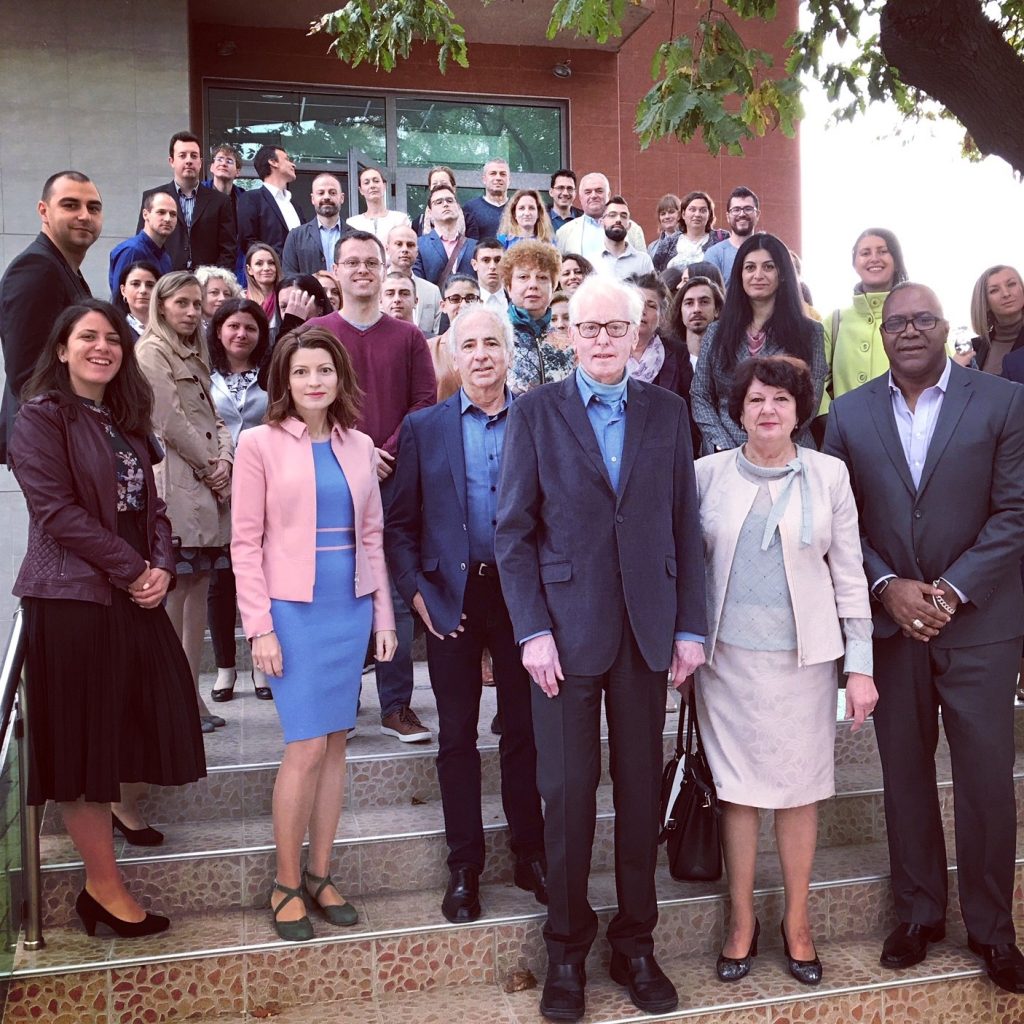 At the same time, the MOBI (My Own Business Institute) program was presented by Professor Drew Starbird in Sofia. The course has been completed by about 20 Bulgarian entrepreneurs. MOBI was also offered at the University of Economics in Varna. Additionally, a high school entrepreneurship program, in which students from leading Bulgarian high schools took part, was initiated by the Proznanie foundation, in partnership with the Bulgarian Entrepreneurship Center.
At the same time, the MOBI (My Own Business Institute) program was presented by Professor Drew Starbird in Sofia. The course has been completed by about 20 Bulgarian entrepreneurs. MOBI was also offered at the University of Economics in Varna. Additionally, a high school entrepreneurship program, in which students from leading Bulgarian high schools took part, was initiated by the Proznanie foundation, in partnership with the Bulgarian Entrepreneurship Center.
The lecturers BEC invited also participated in the Innowave 2018 conference in Varna.
Norman Winarsky, Jamie Williams, Drew Starbird and Larry Biehl gave numerous media interviews (bTV, Bulgaria On Air, Bloomberg TV Bulgaria, Europe TV and Bulgaria 24).


